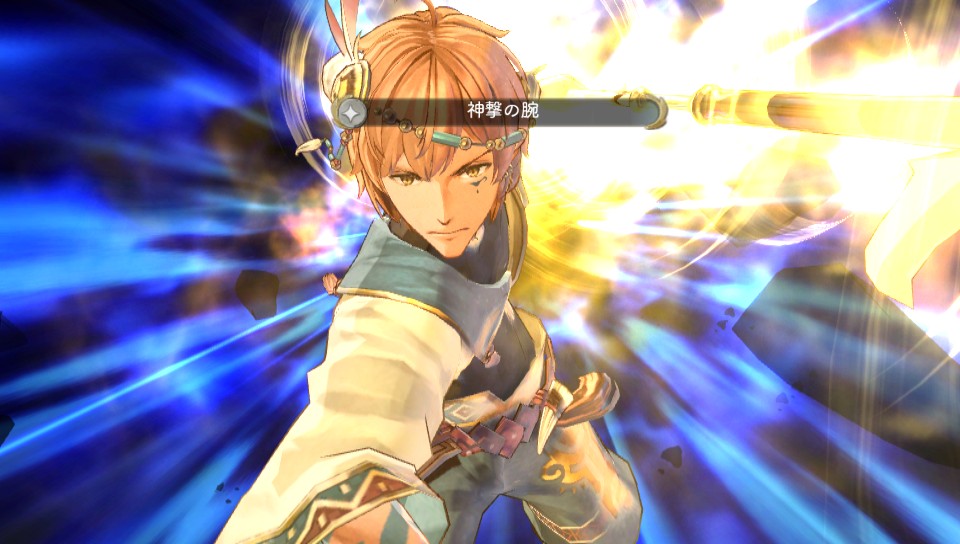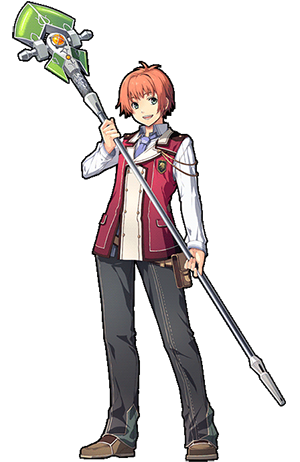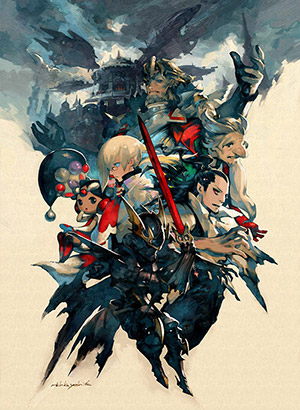February 8, 2016 Lucien Dodge is a voice actor whose star is steadily on the rise. Not only has he done extensive work for smaller/indie games, but he has also lent his talents to games from more prominent developers and several anime, including Fate/Zero. The role he's most noted for here at RPGFan is as the titular hero in Dust: An Elysian Tail — an indie darling that has garnered much acclaim from audiences and critics alike. Although not a household name yet among video game and anime fans, Lucien's vocal versatility and natural ability to become the myriad characters he portrays lead me to believe that he can, and will, become a go-to guy on the video game and anime circuit. Lucien was kind enough to take the time out of his busy schedule to chat with us about his experience in, and passion for, voice acting.
Lucien Dodge: As a deathly shy, reserved child, I discovered an outlet for my creativity by... of all things for a super introvert to do... performing in school plays. I think there was something very freeing, and even therapeutic about creating a character which could act as a shield for the bulk of my insecurities, and allowed me to express myself in ways I was otherwise too scared to. This passion evolved when in a moment of uncharacteristic boldness I volunteered to play the very verbose lead role in our 8th grade production of Moliere's The Phony Physician (otherwise known as The Physician In Spite of Himself). My Mom signed me up for acting classes shortly after that, and I continued to pursue acting in plays for high school and local theatre companies.
It was around this time when a friend of my Mom's gave me for my birthday a box set of my very first anime series, "The Slayers", which started the domino effect that lead to me becoming a fan of the genre. As I recall, I was watching Gunsmith Cats when I had the epiphany upon recognizing one of the character's voices from a previous anime series that there were in fact actual flesh-and-blood people who did the voices for these characters. In response to my sheer obliviousness to this reality, I decided to investigate this mysterious corner of the acting world, researching as much as I could while also engaging in my own "vocal experiments" with the help of a well-timed birthday present from my Dad, who gave me his old 4-track recording deck and a Shure SM58 microphone. In doing so, I fell in love with the purity of the medium and the immense amount of freedom and creativity it employed, being able to portray a far wider range of characters than I had ever been given opportunity to do so on stage. From that point on, there was no doubt in my mind that this would be my career.

Lucien: While his acting doesn't quite hold up as well upon revisitation, the original English voice of Zelgadis from The Slayers made a large impact on me at the time. I had never before in an animated series heard such a restrained, quiet performance, which to me demonstrated the ultimate level of power and class, while at the same time giving him a sensitivity that made the character all the more interesting.
Early on in my studies, there were a number of performers who I had the privilege to work with through the National Audio Theatre Festivals workshops (Simon Jones of Hitchhiker's Guide to the Galaxy, David Ossman of The Firesign Theatre, and esteemed audiobook performer Barbara Rosenblat to name a few) and gleaned parts of their method and the occasional direct piece of advice regarding such things as "thinking outside the box" in creating a character, the power of intensity vs. sheer volume, and comedic timing.
Some years ago I recall listening to a behind the scenes clip of Billy West working on the Howard Stern show. Billy was running a scene, playing everyone of course, and in the middle of performing one of the characters, Howard cuts Billy off very unceremoniously, complaining that he "didn't like the voice." At that stage in my development as an actor, that kind of stark dismissal would've crushed me, and I thought it was an awfully rude thing to say to such a premiere voice talent. But without a hint of offense, Billy replied to Howard with, "Oh!... Okay..." Within that two word response, I realized that Billy was confident enough in his abilities that he didn't need to feel threatened by Howard's remark, and responded as if to say "I'll give you something different then, no problem. Whadya need?", all with relaxed humility. That outlook certainly stuck with me.
The big one, however, would be Corey Burton, who in addition to his multifaceted and superb work over a 40-something year career has given me more advice and guidance than I can succinctly recount, starting very early on in my professional pursuits through a message board that was adjunct to his website, where he generously answered any questions that we had for him on the craft and business of voice acting. This correspondence evolved over the years and lead to the close friendship that we have today, and he is the only person who I'd be comfortable calling my mentor. Not only did he give me tips about acting, but more importantly he imparted a healthy mindset in navigating the turbulent tides of "showbiz" as an artist, and striving for the highest possible standard of work.
In that same vein, I also admire Charlie Adler for his empathy and humanist outlook on the acting profession, his unabashed honesty, and abhorrence of the mediocre.
A few other actors that I like for their great character work and will at times use for reference include Gary Oldman, Dwight Schultz, and Peter Stormare.

Lucien: For the most part, it's an endeavor of mental preparedness. In absence of a script, which we usually don't get ahead of time, I like to find whatever material that's available of the project I'm doing in order to get a general idea of how my character fits into the story, and then leave the rest alone. Too much or useless information can really muddle the key aspects I'm looking to focus on in that moment, preferring to be guided by the writing and voice director. There is a certain element of improv involved in this work in that things can change very quickly, which is why I'm cautious to not "lock in" to any given idea I have about how I'm going to perform a character or scene in advance.
If the placement of the voice is something which I feel may not be immediately accessible, I'm extra mindful to exercise and warm up that part of my range before my session, as well as avoid any kind of food or drink which through experience I feel would negatively affect my ability to produce the tone or register needed, though I'd say most of the characters I've done require no physical prep time at all.
Primarily, I try to make sure that I'm mentally alert and agile. As of late, I've taken to stimulating my brain on my way to work with various forms of audio entertainment, with a revolving playlist consisting of music and audio dramas. These characters live in the imagination, so I figure the more warmed up that area of my brain is, the greater the results.
Lucien: It varies from project to project, but I would say the majority of projects that I've worked on utilize only a script, and of course the director's guidance. The few times when I've been able to see concept art, or an "animatic" (a slideshow of storyboards, sometimes set to music or a temp vocal track) has been a real treat. Naturally for any kind of dubbing work, you're working off of the visuals themselves, which provides its own challenges and rewards; working within the confines of the completed animation (or live action footage, depending on the project) necessitates added technical challenges regarding timing, but it can be very useful to use the body language and overall attitude of the character to inform your own performance.
Lucien: They certainly can be, especially when done over an extended period of time, or doing very intense bursts multiple times in succession. The principle behind performing a creature character is actually the same as a normal speaking role, in that you are emoting and reacting to what is happening to or around your character. In Disney Infinity, I played a number of the inhabitants who communicate various emotions and actions with only sounds, and was given a list of situations that the character would engage in: Laughing at something that just happened, scratching their head in confusion over something someone said, suddenly having a brilliant idea, or being hurled a dozen feet through the air. Because you don't have dialogue to inform the audience what's going on, you have to be extra clear in your intention to communicate that information.
For Diablo III, it was cool because I got to actually see animation loops of the monsters engaging in various actions which I would then perform in sync to in getting a sound that matched that action. It was the same with Mega Gnar for League of Legends, as I recall. Similar to a grueling military video game session with a lot of shouting, it's important to keep tabs on your vocal fatigue and make sure you're not over-extending yourself, taking breaks and soothing your voice with warm tea or whatever your choice of vocal remedy when necessary.
Lucien: I'd say the differences mainly come down to budget and resources. The studios the larger companies are able to hire are equipped with state of the art equipment and staffed with a recording engineer, whereas indie projects being on a much tighter budget tend to rely on you delivering recordings from your home studio facilities, for which you are directly responsible in ensuring their quality. The high profile studios often employ the work of a voice director with numerous years of experience in the business, including some of the best in the country, and are knowledgeable in getting what they need in a timely manner.
Indie projects, not surprisingly, tend to rely on the creators to facilitate the voice recordings who may not be as experienced in working with actors, and as a result can be tricky in understanding what they need. You can find some really wonderfully creative and original works in the indie market however, with people just as, if not more so creatively invested in the outcome of their product, which is a real joy to work with.

Lucien: Yes! While I wouldn't say I'm a "hardcore" gamer, I've been playing video games since I was quite young, so I have an added investment in making sure I'm doing the genre justice. Naturally, there are many elements that are out of my control which can contribute to a performance that is below my standards, but like with any other type of work I feel the need to "check in" every so often to make sure I am doing as much as I can for it to be the best it can be. As far as the types of games that I enjoy playing, I've always been a fan of RPGs or games with RPG elements, so I really enjoyed Dust: An Elysian Tail for that reason, in addition to just being beautifully crafted with lots of love. And while I have yet to play it, I have a strong feeling that Legend of Heroes: Trails of Cold Steel will be right up my alley.
Lucien: Well, video games of course. I enjoy home cooking, when I'm not feeling too lazy. I'm interested in writing some short form audio skits, but I tend to lose motivation very quickly. I have been forcing myself to read more, recently re-visiting an old favorite of mine by Haruki Murakami called Hard Boiled Wonderland And The End Of The World, as well as the Sandman graphic novels by Neil Gaiman.
Lucien: I would really love to be in more Western animation, and work alongside all the greats in the animation world. I'd like to travel abroad at some point, even being the home body that I am, exacerbated by the shackles of being an actor and the accompanying paranoia of needing to be available for work at all times. I'd also like to dabble in adapting scripts for anime, having had more than a few sessions become a discouraging chore due to awkward phrasing and lack of character.
Lucien: Be gracious, work hard, and love what you do. Don't feel that you need to throw away your other hobbies, interests, or eccentricities; those things will only make you a more interesting actor. Live a joyous life.
Lucien: Why does the porridge bird lay his egg in the air?